Let’s play the assumption game. Let’s assume this cool new job opportunity / promotion comes up, giving you a chance at a company position with people you genuinely like and respect. That’s cool, but let’s assume that you’re kind of involved with the company already, at least peripherally. Can you even compete? Alright, assuming your status allows you to enter, can you even make it past the preliminaries to the main event? Sure, play in the main event, but can we assume your presence won’t smack of favoritism? Who cares what people think, do a good job and they’ll know you deserve to be there? Okay, that make sense, but what if after all that you get eliminated? What then?
My experience in the Great Designer Search was, to put it simply, a roller coaster. In the months leading up to the GDS, I had carved out a nice niche for myself. I had a column that was going well, I loved working with the coverage team, and on the side I was preparing my entry into law school for the coming spring. Things were going great, if slightly routine. Then, in one column, Mark Rosewater spoke of his new promotion to hire a design intern. Via a battery of tests and challenges, The winner of The Great Designer Search omg could win the ultimate dream job: a design internship. And that was interesting.
As we all know, I did end up making the Big Show. It was fun, although absurdly stressful. My personal victory came when the conspiracy nuts stopped saying I was there through inside shenanigans, and acknowledged I actually made decent cards. I mean, it was possible I was there as the fix. If I was there as a ringer though, I wish they had actually told me. Things were going swimmingly until that little Un-card challenge. On the surface the challenge was simple: “Make five gold Un-humor-type cards. Incorporate every component of card design.”
There were two problems with this particular week’s challenge. For one, I was doing the coverage of Grand Prix: New Jersey the weekend of the challenge. The grand prix was gigantic, and I made some rookie mistakes there besides. All that added up to a way shorter timeframe to actually conceive and execute the crazy cards. Between a job search and my actual job, there really wasn’t a question of which would get the majority of my time. I designed most of those cards on the plane over there, and tweaked and mailed them in over lunch on Sunday. There simply wasn’t any time left to work on conception, much less playtesting. Besides, even if I had a normal weekend like all the other competitors, I still think I would have been in trouble. My second mistake was badly misinterpreting the challenge.
I thought “Silver and Gold” was a half multicolored and a half humor design challenge. I was thrown by the extra instruction of designing art and weird text boxes. In reality, the challenge was one of making cards without the normal restrictions of regular Magic. “If your palette was the creative universe, what would you draw?” It wasn’t until slightly later that I figured this out, but of course by then it was “Game Over.”
Being cut from the GDS was like a punch to the gut. Even though I knew the Un wasn’t my best work, I thought my previous cards were good enough to cover my flaws in the task. And I really liked Respectify. Kenneth Nagle and I had traded submissions before the article went live, and I hated his marquee Big Blind. I do play poker, and that card still pissed me off to no end. I was sure he was going to be X-ed this week, and I couldn’t be dead last after that. Of course, Ken had the right of it all along. If I had the mindset to enjoy Kenneth’s cards, I may have been able construct something similar, to tickle Rosewater’s interest bone. Sadly it wasn’t to be.
I… don’t care to lose. x10. The analysis two paragraphs up came about after sixteen hours of seething and reflection. There was some shame, of course. It’s hard not to have an emotional response after devoting that much time into something. I’m told busting out of the World Series of Poker takes at least a week of recovery, and I believe it. But those visceral reactions passed, and I could reflect on why I wasn’t what they were looking for. I wasn’t precisely sunshine and roses about the finish, but:
A: I had lots of fun playing along
B: It was an amazing deal to get as far as I did
C: Someone else winning was actually better for Magic.
It helped, even more so because I believed it. I liked what I produced, but it wasn’t the best for the game. If there’s someone better out there, Magic deserves it. Integrating that concept was important. The shame passed; people congratulated me on getting far as I did, and I even corrected them when they said I was robbed (my friends are good people). Plus I got a nice letter from judge Devin Low a couple of days later:
…
Dear Noah,
Thank you for your participation in the Great Designer Search. While in the end you weren’t quite what we were looking for, your design choices did strike a chord with some of the judges. Good things come to those who wait…
Sincerely,
Devin Low
P.S. Your lucky numbers are 4, 11, and 21
…
A nice gesture. Was that bit at the end hinting at something, or was it just random fortune cookie rhetoric? I didn’t know, and I didn’t pursue it. There was a more pressing problem after the GDS. Having been savagely cut short, I had a notebook full of card ideas that needed to breathe. My local friends, those that were following along, had card ideas of their own too. Clearly, for catharsis alone, we needed a BOO draft.
The BOO (Build Our Own) draft has been a consistent hit for as long as they’ve been done. Eight people make sets of exactly 45 cards, we shuffle them up, and draft them. If I had to attribute one thing to my inclusion in the GDS, it was playing BOO drafts with Washington’s finest. You learn real quick if a card you made sucks or not when it’s a fifteenth pick, or when it’s bashing your brains in. In normal fantasy card design, people make all kinds of craziness, not needing for them to be balanced because those cards will never see the light of day. Doing that in a BOO draft is a quick way to get chided, besides the fact that there’s a much higher chance of someone else drafting a particular bomb than you. It’s a trial by fire, but a very entertaining one. After following along with the GDS for so many weeks, all the regulars were chomping at the bit to play again. In fact there was so much interest, we held a small tournament where the winner got to be BOO player #8. Isn’t the media grand?
As usual, given that these cards are solely designed for Limited play, and we all know what we’re doing, shortcuts are both allowed and encouraged. The truth is, we’re more aware than the beginning Magic player the game has to acknowledge when making cards. Why not utilize that status in our design? FUBU BOO, as it were. It lets us get away with all kinds of things, such as using rules text “It’s like ninjutsu.”
Now as I said, I had a notebook full of ideas. A lot of these were just random cards that came to me whenever. But a good portion were answers to potential problems. I had no idea what the challenges each week were going to be, especially before round 1. I could wait around and be surprised, or I could imagine potential challenges and come up with answers ahead of time. Imagining the question and my response is similar to how I work in Magic, and I felt good about it for the GDS. Here’s a few:
Challenge: Make a Green removal spell
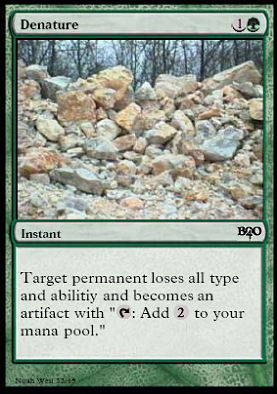
Challenge: Make a card relevant in Vintage
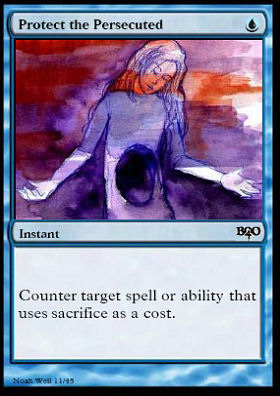
Challenge: Make a cool sexy dragon
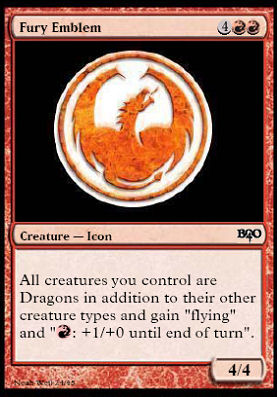
Challenge: Make a gold Un-card that doesn’t suck
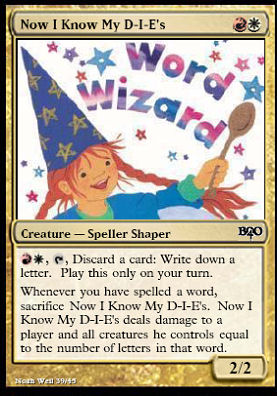
Oy, the hindsight of that speller shaper. As it turned out, my presumed challenges were way off base in their simplicity, although they did provide decent cards. I also had some mechanics lined up that were never, ever going to be entries. For example, Aftcast seemed like a bad choice to display one’s creative talents:
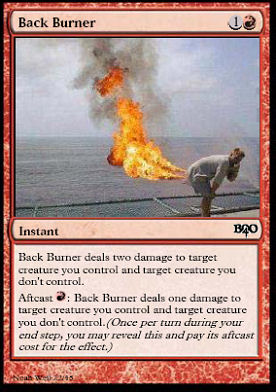
But I had some real ones too, including Tune. Tune was my personal Kicker variant, except it worked in both directions. With Tune: X, you could pay exactly X less or X more for the spell, which modified the effect. For example:
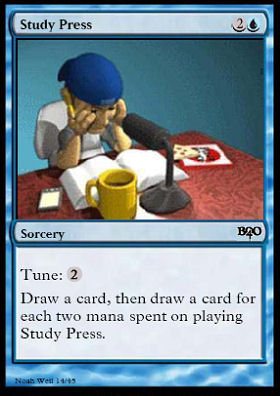
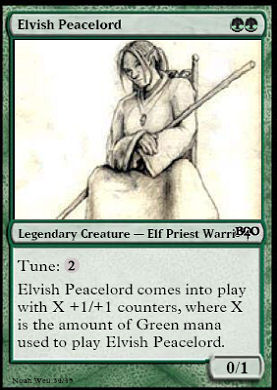
I know being Legendary doesn’t mean much when the entire block is Highlander. I just needed some fix so it wasn’t strictly better than Elvish Warriors. There was nothing flashy with Tune, but it was a nice workhorse mechanic that filled some holes. I’m proud of it.
The other GDS mechanic was one called Takeback. Essentially it was the Blinking Spirit ability. The difference was that Takeback worked everywhere except the graveyard, which included RFG and on the stack. In the end the mechanic didn’t really add much to the experience, probably because I overcosted cards with the ability. It was a tough mechanic to measure. Between fake mechanics, real mechanics, and ideas overflowing from design promotions, I was happy with my set. Everyone else did a great job too:
Brian Wong
Brian was one of the last 32 people in the GDS preliminaries, and in my opinion, definitely should have been a contender. Brian always makes some kooky yet elegant cards, a winning combination for formats like these. Of his 45 this time, far and away my favorite was this one:
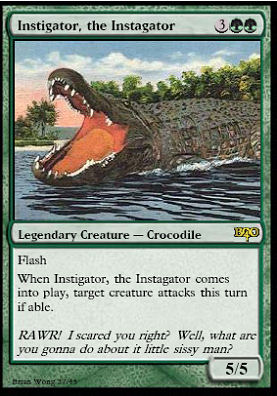
Great design and high honors for being so laugh-inducing.
Eric Reasoner
Eric brought two items to the party, a talent at card design and the store key. Graciously allowing us the use of his game store for our fun, Eric was also one of the big organizers of the event. Unfortunately not all of his cards were gold, as Emergency Errata was emergency banned before the event took place, and Noah’s Pact With the Devil soon followed suit. Despite a couple of lapses, Eric cards were well received. His major mechanic was Twitch, a fine device that’s probably printable exactly as written:
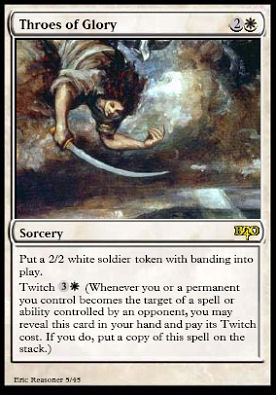
Tony Mayer
We had a last minute cancellation, so local level 3 judge Tony Mayer stepped in for the 11th hour and made half a set’s worth of cards in about 30 minutes. What was more impressive than Tony’s gung-ho attitude were his cards, which were totally reasonable and fun for Limited play. Everyone makes insane / stupid stuff their first time, except Tony, who took to the process admirably.
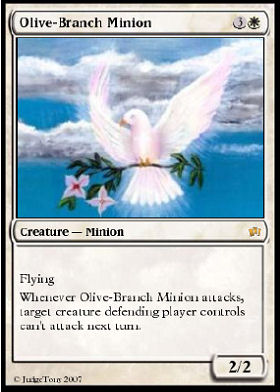
Christian Robertsen
Christian also had some unexpected commitments, so much so he wasn’t able to quite flesh out a few cards. You may note in his file a card with no text. We considered leaving it in there just for cuteness (better than One With Nothing!) but in the end we split the difference and replaced it with a Foil Squire. Long-time readers of this series will recall that Christian is an absolute genius at wacky but effective design. His stuff is consistently among the most popular cards.
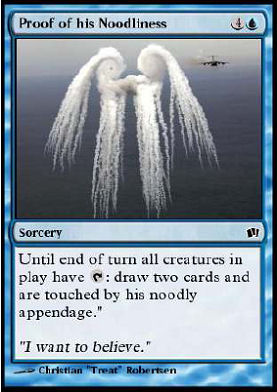
Could that be printed tomorrow? Almost…
Matt Ruhlen
I’m not sure if Matt is crazy or he just thinks we all design like babies, but his stuff is always the most broken out of everyone’s. I’m guessing the former. We have a game where we call out who designed our first pick. This time? Seven Matt Ruhlens. The only person not to take a Matt Ruhlen card first was, of course, Matt Ruhlen. His theme this time was ambitious too. 45 cards, zero casting costs. Everything had either morph or suspend. And wouldn’t you know it, the set worked really well. Those two mechanics play extremely well in Limited. Broken or not, his cards totally enhanced the experience for everyone.
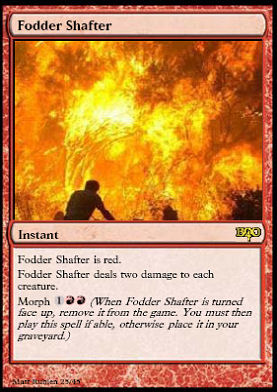
By the way, Matt’s cards worked in that sorcery-morphs could only be played when you could actually play sorceries. A neat fix, although cards like this one probably deserved type-shifting because of it.
Thomas Kiene
Thomas, current Washington Constructed State Champ, was the winner of our BOO satellite tournament. His inexperience was evident, but he was infectiously enthusiastic about the process. His original set had problems, but everyone worked together to tune it into a reasonable submission. Thomas had two parts to his cards. The first was a Bear theme, such as cards that enhanced 2/2s in play. Through strictly good fortune, that theme played very well with Matt’s 90% morph set, to make some pretty interesting board situations.
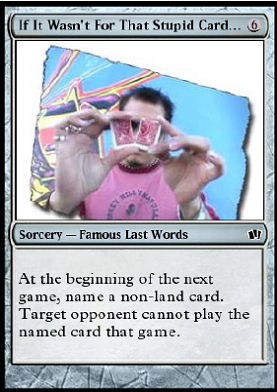
Thomas’ other theme was a set of cards called Famous Last Words. This was a subtype of cards that were actually death triggers. When you died, you could search your deck or sideboard for one and play it for free. I’m pretty sure the rules can’t get near supporting something like that, but hey, this was BOO draft. Their power level was pretty reasonable actually, which made for a solid design and interesting placement in pick orders. How high do you take cards that work best when you’ve lost a game?
Ricky Boyes
In my view, Ricky took the crown as best BOO designer. I liked all his stuff, which included a great mix of innovation, power, and flexibility. He has a real talent at splicing mechanics together, as well as re-interpreting existing ones. If they ever run another GDS and Ricky decides to enter, he gets my vote for going all the way.
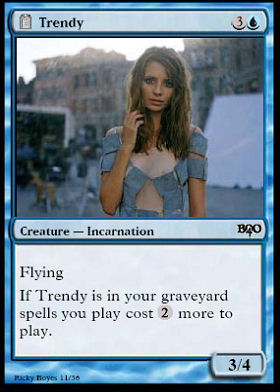
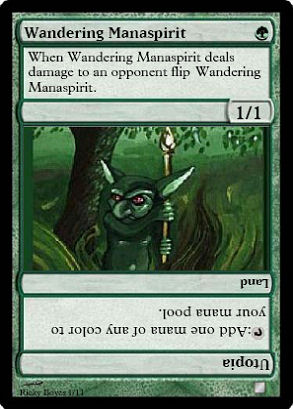
If anyone wants to see the rest of the designed cards, as well as past ones, check out Brett Allen’s site here.
It was a good time, one of our best BOOs yet. Afterwards, we all went out for food and drinks, then some Wii action. It was a great day. Unfortunately there a bittersweet air attached to things, as it was my very last BOO draft. It turned out Devin was hinting at something coming down the pipe. They liked my approach to card balance, so a few weeks ago I received an invitation to join Wizards as a member of R&D.
I accepted.
Unfortunately, that means this will be my final article for StarCityGames.com. I don’t think I can express how much this community means to me, except to say I know I wouldn’t be going to Renton without it. So let me just thank everyone I was lucky enough to meet personally, as well as the rest of the readers, for allowing me to contribute to this wonderful game. My time with Magic has truly been amazing, and I’m happy to move forward on a high note. I wish everyone the best in their future projects. It’s been a pleasure.
